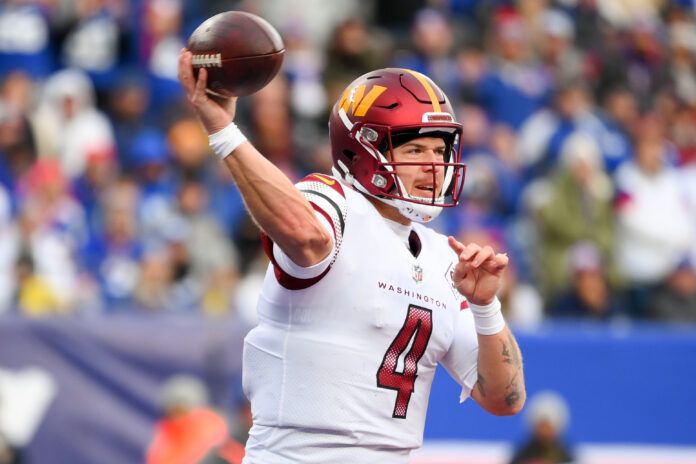The Washington Commanders 20-20 tie with the New York Giants marks another game in favor of Taylor Heinicke as a viable starting quarterback. Under Heinicke, the team has been 5-1-1, with the loss coming against the 10-2 Vikings and the 7-4-1 Giants serving the tie. It’s not a bad place to be.
Washington Commanders’ Defense Makes Them Playoff Contenders
It’s often difficult to interpret ties in the NFL – there’s a sense of directionlessness following a tie, and the unmoored feeling can overwhelm other interpretations of the game. But it’s important to recognize that Washington may have become real contenders in a contentious NFC East.
While it will be too difficult for them to catch up to the Eagles as potential division winners, they might be able to sneak into the playoffs as the fourth team from the division and seventh team from the conference, something the tie with the Giants helps them do.
Heinicke’s somewhat more careful brand of play complements their strong defense. Like many of the best defenses in the NFL this year, they’re built from the defensive line out – Da’Ron Payne and Jonathan Allen form a deadly duo in the middle, and Montez Sweat does an excellent job himself.
MORE: Week 14 NFL Power Rankings See Commanders Rising
Daniel Jones still found a way to generate 71 yards on the ground – an increasingly important part of the Giants’ offense and one they seem to be comfortable leaning on – but Jones was held to 5.71 yards per passing attempt and couldn’t score in overtime, in big part because of the pair of sacks he took from Allen and Payne.
Overall, with four sacks and eight tackles-for-loss, the defense did an excellent job flexing its muscles, and their final numbers are hurt by a touchdown the Giants scored on a short field as a result of a Heinicke fumble on a sack caused by Giants second-round pick Azeez Ojulari.
Mistakes like that aside, Heinicke showcased poise under pressure and was a key component of their comeback-and-tie against the Giants
Taylor Heinicke Can Lead the Washington Commanders in the Playoffs
Not only did he perform well despite an assault on the pocket – one which saw him take nine logged quarterback hits – he led Washington down the field on a 90-yard drive needing a touchdown to tie, scoring with under two minutes left in the game.
Critically, Heinicke connected with Curtis Samuel on a 25-yard toss, following that up with a 28-yard touchdown throw to Jahan Dotson, who put together one of the best demonstrations of yards after the catch we’ve seen this year.
Since Week 5, no team has scored more than 21 points on the Commanders. The fact that Heinicke took over in Week 7 seems relevant to the statistic; 70.8 percent of offensive drives ended in a punt or turnover under Carson Wentz, while 59.8 percent of offensive drives under Heinicke have ended by giving the ball away.
The Washington defense is going to get better when they return Chase Young to the lineup, meaning they’ll have a playoff-caliber defense accompanied by a quarterback who can do enough to keep the game in play until it comes time to take more chances late in games and lead fourth-quarter comebacks.
Heinicke isn’t like many weaker-armed quarterbacks and prefers to take chances or hold on to the ball in order to wait for receivers to get open. He’ll manipulate the pocket to escape sacks in order to maximize those chances, and then he’ll throw to his talented receiving corps and trust them to make a play.
MORE: NFL Playoff Picture Following Week 13
It’s pretty similar to another former Washington quarterback and former Vikings teammate, Case Keenum – in 2017, Keenum helped lead the Vikings to the NFC Championship game, accompanied by a fantastic defense. Their playstyles are very similar, and so long as Dotson, Samuel, and Terry McLaurin can make good on the trust Heinicke gives them, they can make some noise.
Heinicke seems to have found a good balance between risky play and explosive potential; Wentz would regularly put the ball in trouble without much payoff. His passes didn’t always reward receivers with accurate balls, and the distribution of passes was unusual; McLaurin is the star of their passing game but only received 19.7 percent of the targets Wentz was doling out.
Heinicke has increased that measure to be in line with most top receivers, targeting McLaurin at a 30.8 percent rate. That, along with generally more accuracy, has improved the yards-per-attempt, first downs per attempt, and yards per completion despite a lower average depth of target.
The fact that Heinicke has held on to the ball longer than Wentz, seen a higher pressure rate, and still seen a substantially lower sack rate is another reason Heinicke has been able to generate more yardage – waiting for receivers to clear defenders to maximize yards after the catch while avoiding negative plays.
That’s going to be an area of concern going forward; Heinicke needs to more consistently get rid of the ball on time and hit receivers within the timing of the offense. But for now, it’s helped the receiving corps rack up yardage while the defense continues to stifle opposing offenses.
The Vikings moved on from Keenum after their magical season, and Washington might want to consider the same if Heinicke doesn’t resolve some of his biggest problems. But for now, this kind of managed risk-taking could lead to a playoff run.

